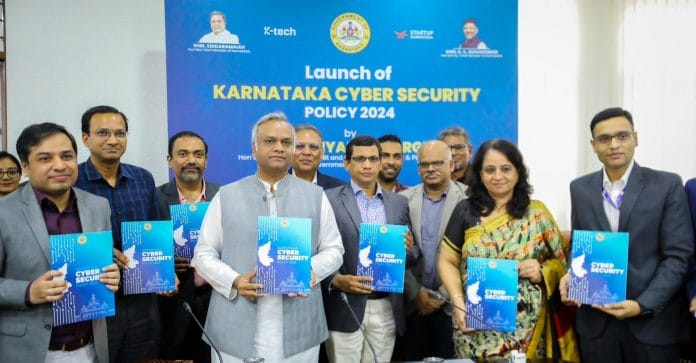Bengaluru: The Karnataka government rolled out a dedicated cyber security policy Thursday in a bid to provide support of state-backed infrastructure to the efforts to contain the growing menace of online fraud and other cyber felonies.
The Karnataka Cyber Security Policy 2024, released Thursday, said it was geared towards strengthening and safeguarding the state’s IT infrastructure and assets, as well as collecting strategic information on incidents of crime and threats, among other use cases.
One of its stated objectives is “to establish Security Operation Centre (SOC) for all the Government critical IT Infrastructure projects for obtaining strategic information regarding incidents, threats reported as part of the Infrastructure and its system by creating incident response, crisis management through effective, predictive, preventive, protective, response and recovery actions on 24/7 basis”.
The policy has been introduced at a time when cases of cybercrime have been on an uptick across the world. In India, phishing scams, online fraud, and deep fake videos have become more rampant over the years, particularly with data becoming cheaper and more Indians using their cell phones to store personal information and for online transactions.
Between 2021 and 2022, there was an increase of 24.4 percent in cybercrimes reported across the country, according to data from the National Crime Records Bureau (NCRB).
With 11,025 cases, Karnataka, with Bengaluru as the epicentre, topped the list in 2022, followed by 10,991 in Telangana and 5,515 in Maharashtra. In fact, online fraud made up 87.8 percent of total cybercrime cases registered in Karnataka, ThePrint had reported.
IT/BT minister Priyank Kharge said that the policy was aimed at recognising the importance of cybersecurity and was aligned with national and international efforts to combat it.
“It will also foster innovation and growth within the cybersecurity sector, ensuring that Karnataka remains at the forefront of technological advancement and becomes the leading cybersecurity hub of the country,” he added.
Also read: Armed with scripts, fine-tuned accents, Gurugram ‘call centre’ agents duped elderly in US, Europe
Incentives and concessions
The first section of the policy has two parts — one, which emphasises building a strong cyber security ecosystem, and, the other, which talks about strengthening the cyber security posture of the state’s IT assets. “Whilst the first part will be in public domain, the second part will be internal to the state’s IT teams and departments for their IT implementations,” according to a government statement Thursday.
The total financial outflow for implementation of the Cyber Security Policy for five years has been estimated at about Rs 103.87 crore, which would be met from the budgetary allocations for the Department of Electronics, Information Technology, Biotechnology and Science & Technology.
Of this, Rs 23.74 crore would go towards providing incentives and concessions.
The policy document proposes internships for students with a target to facilitate 600 undergraduate interns and 120 post graduate interns during the policy period. It offers a stipend of Rs 10,000 to Rs 15,000 per month for a maximum of three months to Karnataka-based undergraduate and postgraduate interns.
For research and development (R&D) projects in the cybersecurity domain, driven mainly by Karnataka-based start-ups and in collaboration with Karnataka-based academic institutes, the policy offers grants of up to 50 percent of the project’s total R&D cost, or up to Rs 50 lakh.
The policy also includes reimbursements of up to a maximum of Rs 1 lakh towards engagement of Karnataka-based, CERT-In empanelled service providers by start-ups registered with the Karnataka Start-up Cell for cybersecurity audit.
Kharge said that the policy aims to build a dynamic, secure, and resilient cyberspace for all government-to-government (G2G), government-to-business (G2B), and government-to-customer (G2C) services of the state government.
“Beyond establishing a secure cyber ecosystem, the policy aims to create an assurance framework, strengthen the regulatory framework, quickly respond to security threats, protect critical information, reduce supply chain risks, and develop human resources,” Kharge said.
The state government also signed a Memorandum of Understanding (MoU) with the multinational IT firm, Cisco, to train 40,000 people in cyber security skills and awareness.
The Indian cybersecurity market is expected to account for 5 percent of the global market by 2028, according to India Cybersecurity Domestic Report 2023 by not-for-profit group Data Security Council of India (DSCI), published last year.
The Indian market reached around $6 billion in this vertical in 2023, growing at a rate of over 30 percent between 2019-23, the report said.
(Edited by Sanya Mathur)
Also read: Govt grants patent to Bengaluru firm for first-of-its-kind system to manage Aadhaar data






